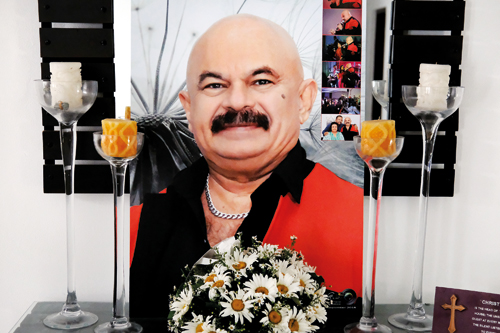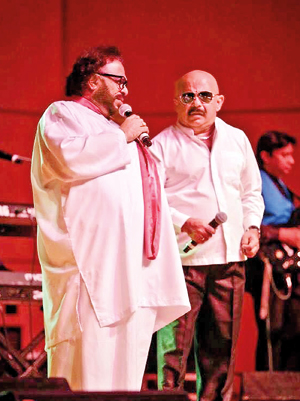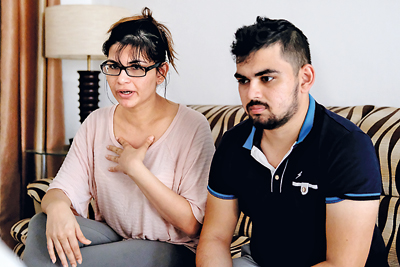He stole the show on stage and off

Spreading love and laughter: A portrait of Ronnie Leitch at his Dehiwela home. Pic by Amila Gamage
The limelight seems empty, the uproarious hilarity he once provoked has faded into a silence that washes over everything. As the nation mourns one of its best loved singers and comedians, there is disbelief first to overcome. How could he have given up on us, when the party seemed to be at its gayest and liveliest?
“Suddenly.. Due to a cardiac arrest… In Perth while on tour…” the phrases buzzed around creating shock waves before the sense of bereavement settled in.
Ronnie Luke Leitch was the man known for his signature shiny bald pate, his ebullient songs, his wonderful humour and his sparkling personality. But as we delve into the memories he left that people hold and cherish, Ronnie the private individual (as opposed to the showman) emerges, and we see just why he was so loved.
Ronnie was born in 1953 (which makes him 65, 19 days shy, at death). The young ‘Dehiwela Burgher’ was educated at Arethusa College, Wellawatte. The entertainer in him was ever irrepressible. In 1972 he was a rather memorable contestant at the Talent Club of Ceylon’s All Island Talent Contest. Equally well remembered is his love for movies and singing. He became the lead singer for Eustace Perera’s band Aerodynamics. He was with them till 1976 and he would go on to sing with bands like Pioneers, Super Golden Chimes and Haze, grooving in those palmy days at hip haunts like La Langousterie (in its old avatar), wooing revellers with his own renditions of chiming golden oldies as the disco glamour shimmered in the air.

Sunil and Ronnie: Together they brought laughter and political commentary over the years to Lankan audiences here and abroad
He would sing into the eighties. In the middle of that decade he married Yvette. It was sometime after this, around the time his daughter Keshia was born, that Ronnie Leitch metamorphosed into that public icon people would lustily clamour for as Thattaya. Piyal Perera, brother of Sunil Perera of The Gypsies, who should take ‘full responsibility’ for that transition, takes up the story.
“Ronnie used to join us in our trips to outstation concerts. One day when we did a gig in Meerigama, as usual Ronnie joined us and Sunil invited him to sing a song with us on stage. Ronnie was wearing a hat and while he was singing the hat fell off exposing his partially balding head. Some people near the stage shouted “Ado thattaya’. I was on the side of the stage watching with Hemasiri Halpita. Immediately I asked Halpita whether anyone has written a song about ‘Thattayas’ and when he said no, I asked him to come to my place the very next day to write a song about a thattaya for Ronnie.”
Piyal was adamant that Ronnie should shave his head if he was to sing the song on stage, and the head of hair which was lushly curled and jet black on the sides would go for good. Ronnie would begin religiously shaving his head every day.
Apart from Thattaya, one of his best-loved Sinhala songs was ‘Kauda bole Alice’, though his repertoire is rambling, with such glittering numbers as ‘Atha mita kasi panam’, ‘Darling my love’ and ‘Loka shoorayo’. As a singer Ronnie was coached by the late Clarence Wijewardene, and so had the greatest regard for that “King” of Sinhalese Pop.
Though Ronnie, as was his wish, would always be known first and foremost as a singer, he was a born comedian, and in so many films made mirth bubble over, often with his rendition of the bully with sarong tucked up. The reason why he managed to bring up the ludicrous side of the bully boy was probably that he was never one himself.
Everyone whom he was connected with remembers how concerned he was of the happiness of others. His beloved children Keshia and Keshan reveal that one reason he loved to joke was that he loved to see a smile lighting up anyone’s face. “Though he hated injustice, sometimes he would not confront people because it would be an insult,” they say. “He was very hard to understand that way. The affection he had for people was limitless-so was the way he perceived the world. He always saw the positivity- he wanted to ensure that he gets to the point where something turns out to be positive.”
“When we were fretting over something drastic, he would always say, ‘listen- this is the silver lining in this’.”
Ronnie’s first film was ‘Ethin Ethata’, and his curls and complexion made him something of a sensation at that time. He would remain part of the Sri Lankan cinema till the year of his parting.

Daughter Keshia and son Keshan, determined to celebrate their beloved father’s life , not just mourn his death. Pix by Amila Gamage
Sunil Perera of The Gypsies, an artiste who would come to be very closely associated with Ronnie, remembers him as “a gentleman and one of the nicest people that Gypsies had the opportunity of working with”. He adds, “I know the Gypsies are going to miss him very much.”
Singer Mariazelle Goonetilleke probably knew Ronnie as long as any stage mate, having been pals since 1973. She was with him in Australia on tour at the time of demise, just as she was his partner on stage during his first tour of Australia, with Mahesh Denipitiya, Peter Rosairo and Eddie Fernando.
She was one of the first to know and felt the blow most keenly next to the family, and you hear her shock spill over as she writes:
“I want to wake up and find that all this is really a bad dream. Can you please give me a call and address me as you usually do? Your favourite nickname for me was Fatso. I want to hear it now!”
Nalin Perera of Marians remembers a “charismatic individual with a golden heart who spread joy and brought laughter to all our lives on and off stage” while Lankika Perera recalls “a kind-hearted, genuine and generous person and one of my favourite singers.”
Rukshan Perera remembers his ‘funny face’ on stage, when one twitch in his features would cause torrential laughter.
Keshia and Keshan, just as their mother Yvette, are devastated, but it is obvious that the legacy and mettle of their father gives them inner steel. They are determined that they should celebrate his life and not just mourn his death.
In the legacy he left them, the lesson of love features large. “We want all parents to love their children like our father loved us. It was unconditional, it was pure, it was innocent. It had no boundaries.”
In all the word portraits- all of them sincere- that get sketched- the picture emerges of a humble, simple, God fearing person incapable of hate. It is significant that he passed away in Australia, a country that so many Burghers who left their motherland now call home. He was also a man of the world, very well-travelled, and saw humanity in everyone despite differences in race, caste or creed. That is why Keshia and Keshan’s message for his fans is to keep him in their hearts and keep loving him. “Because love was the main aspect of him, and love was all he wanted.”


